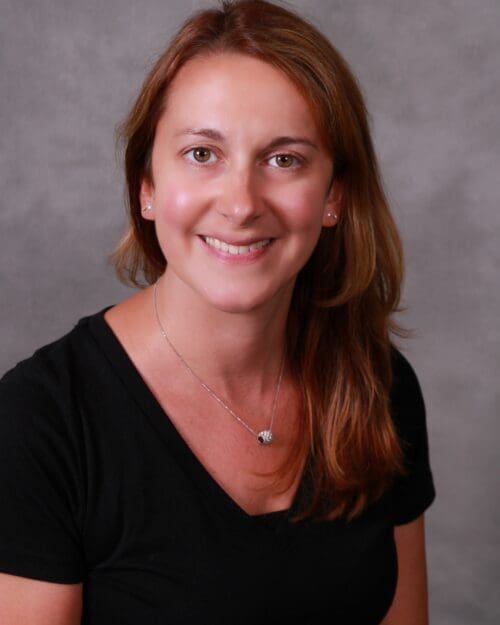Jodi Allen trains PNW’s nurses to meet the pandemic’s challenges

A Real World Approach to Nursing
Jodi Allen, family nurse practitioner coordinator and assistant professor in the Purdue University Northwest College of Nursing, lets out a sigh when thinking about all that’s transpired under her watch from Spring 2020 to Fall 2021.
The COVID-19 pandemic arguably threw no group into a lurch more than healthcare workers. For Allen and her students, real-world skill application and pivoting in a health crisis came right at them.
“In the beginning it was daunting,” Allen said, “but that’s the great thing about being a nurse — you know a lot about a lot, even if you don’t know enough about something, we’ll figure out the rest as we go.”
Becoming a leader
When the COVID-19 pandemic caused Purdue University Northwest (PNW) to move classes to virtual formats in Spring 2020, Allen quickly found her expertise being sought for PNW’s Safe Return to Campus Task Force to craft the resumption of in-person learning.
“I function so much in population health,” Allen says. “I think that my position as a nurse was the perfect fit to work with other people on this task force.”
Allen helped craft recommendations for PNW’s senior leadership team for implementation, which included a face mask requirement, social distancing expectations, disinfectant supplies, procedures in case faculty and staff or students became infected, to name a few. Similar, though slightly relaxed, policies are still in effect at this time for the 2021-2022 academic year.
PNW also served a key role in being a vaccination hub for its students and the Northwest Indiana community.
“This year we were preparing for some pretty high spread, and we’ve had less than 1% of our campus become infected. In a community-based university, especially being in a state that doesn’t have a mask mandate, that can be particularly challenging. That’s a testament to the students wanting to be here and following the guidelines. I was invested to keep the students as safe as possible.”
No nurse left behind
A central component of many College of Nursing students’ education is their clinical requirement before graduation. When COVID-19 came around, many doors temporarily closed to PNW’s nursing students to limit exposure for all parties.
Allen, who oversees the Family Nurse Practitioner program, suddenly had many of her students’ external opportunities disrupted. Clinical hour forgiveness wasn’t an option.
“Panic ensued because they wanted to graduate on time,” Allen says.
She and other College of Nursing instructors assessed what they could do by repackaging where eventual clinical hours could be scheduled to still work with students’ classes. Some students even had 270 hours to complete in a 16-week period.
“I was very proud last year,” she says. “We did not have a single nurse practitioner student that was supposed to graduate in August that didn’t graduate. No one was held back a semester.”
Allen and other nursing instructors were often sources of comfort for the up and coming nurses thrown into a global pandemic. Whether doing hybrid learning or returning to an in-person style, Allen cared to hear how her students were managing in a tough time.
“We always say in nursing there can be a lot of underlying issues besides what’s going on,” she says. “When the pandemic started last year, I had to dig in and almost think about that first: how are they doing outside of school, how are they doing at the bedside with patients, how is their family life — before I can even think about teaching them. Nurses are great at multitasking, but if all those things are askew they’re not going to learn.”
Looking back
When reflecting on all that has transpired in 18 months, Allen sometimes thinks back to her persistent efforts when earning her own Doctor of Nursing Practice and the catchy tagline of Dory in Finding Nemo.
“It was challenging because my attentions were being forcefully divided,” Allen says. “It was a push into the deep end with no life jacket. I didn’t want to have a super toxic positivity all the time, but I tried to be realistic. I can’t tell you how many times I ended an email with ‘just keep swimming.’ It worked, and it’s still working.”